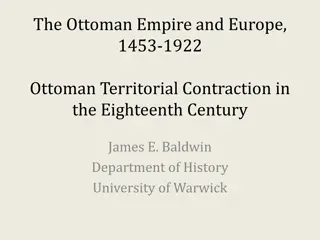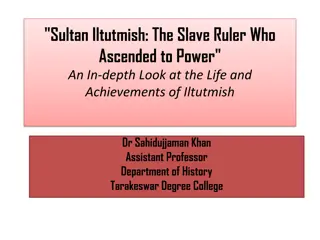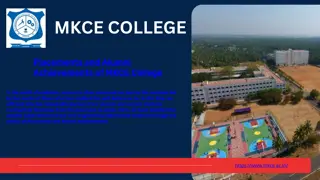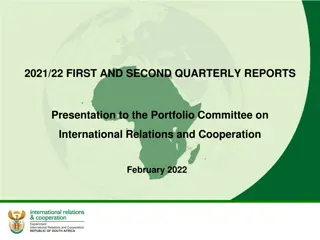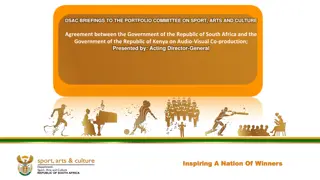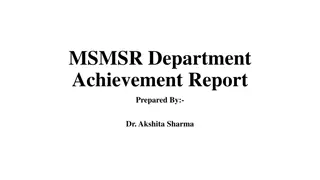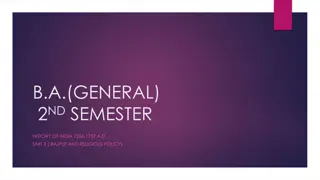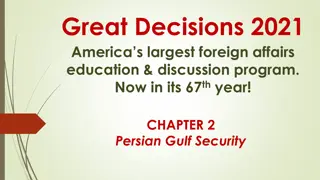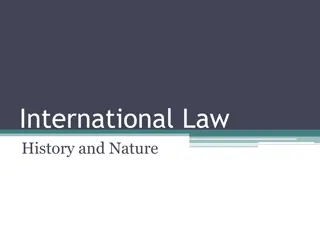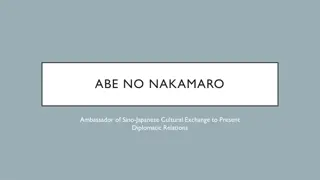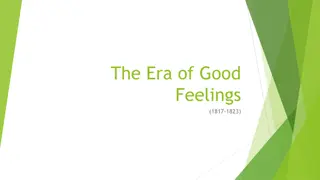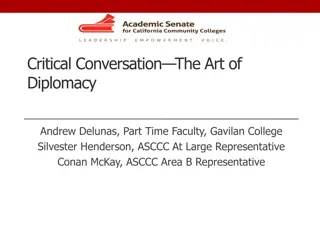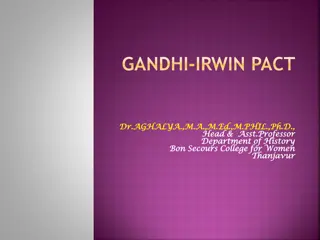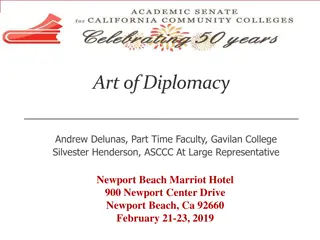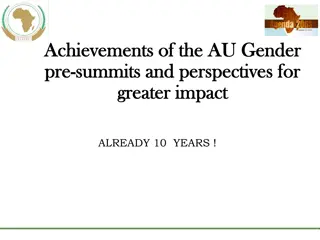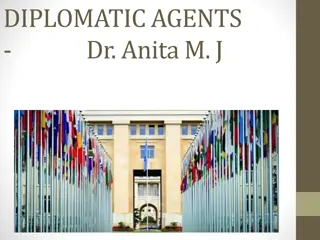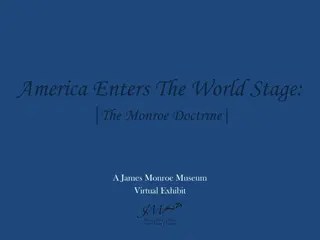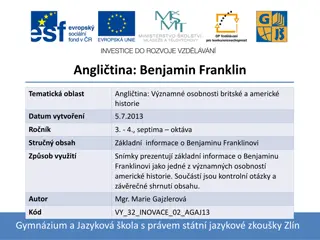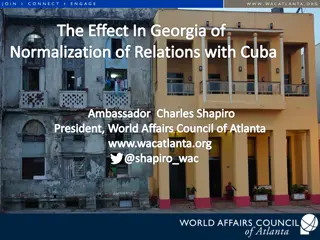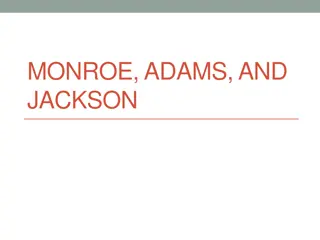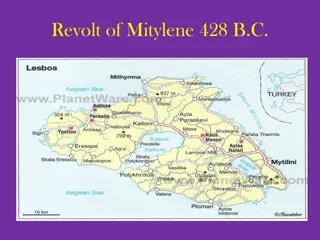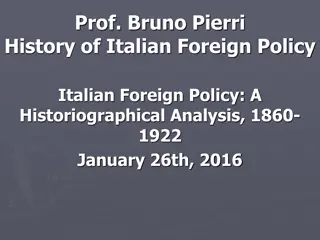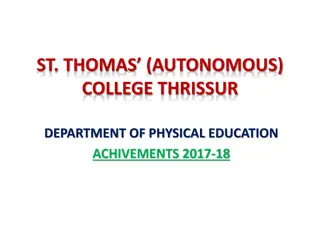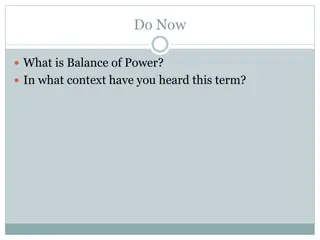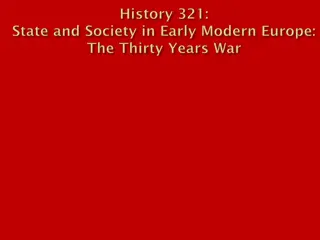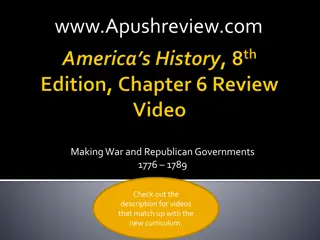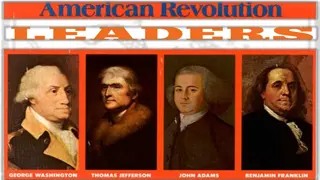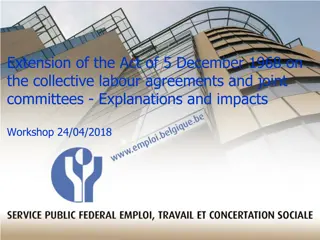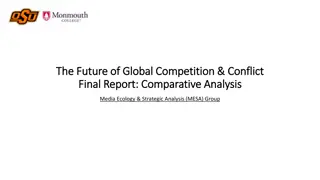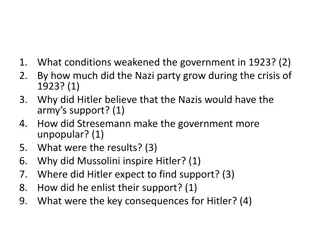Recognizing and Supporting Personal Achievements in Schools and Communities
Investigate how schools and community learning providers recognize and record personal achievements beyond the formal curriculum. Explore ways to enhance support and practice sharing. Findings reveal varied methods of acknowledgment and the importance of involving children and young people in reflec
2 views • 36 slides
Academic Achievements and Awards Summary Report
This report highlights the academic achievements and awards received by students from various cohorts at a school. It includes information on WACE achievements, ATAR distributions, record-breaking comparative measures, perfect ATAR scores, the 99+ Club members, notable students, General Exhibition A
2 views • 12 slides
Ottoman Empire Territorial Contraction in the 18th Century
Ottoman Empire faced agricultural and fiscal crises in the 17th century, leading to internal rebellions. However, by the mid-17th century, the empire had recovered and experienced further expansion, albeit at a slower rate compared to the previous century. In the 18th century, the Ottomans suffered
2 views • 12 slides
Sultan Iltutmish: The Slave Ruler Who Ascended to Power
Sultan Iltutmish, the third ruler of the Delhi Sultanate, rose to power from a slave origin. He faced challenges upon ascension, including factional disputes and external threats. Iltutmish implemented administrative reforms, introduced architectural innovations, and strengthened diplomatic ties wit
0 views • 8 slides
Placements and Alumni Achievements of MKCE College
Placements and Alumni Achievements of MKCE College\nIn the world of academia, success is often measured not just by the numbers but by the stories of those who have walked the path before us. So, in this blog, we will look into the remarkable journey of our alumni, and current students tracing their
0 views • 2 slides
DIRCO's 2021/22 International Relations Quarterly Reports Overview
DIRCO's 2021/22 first and second quarterly reports presented to the Portfolio Committee on International Relations and Cooperation in February 2022 highlight the impact of the COVID-19 pandemic on diplomatic operations worldwide. Emphasis is placed on bilateral engagements, economic diplomacy initia
0 views • 48 slides
Audio-Visual Co-production Agreement Between South Africa and Kenya
South Africa and Kenya signed an Audio-Visual Co-production Agreement aimed at enhancing cultural relations and collaboration in the audio-visual industry. The agreement, signed in Nairobi, outlines a validity period and termination process, emphasizing a commitment to mutual projects. Diplomatic re
1 views • 13 slides
MSMSR Department Achievements Report Highlights
A detailed report highlighting the remarkable achievements of students in sports and academics in various semesters of BBA and MBA courses, along with successful student placements in reputed companies. Notable accomplishments include sports achievements such as long-distance races and tennis tourna
0 views • 12 slides
Rajput and Religious Policy of Mughal Emperors: Akbar vs. Aurangzeb
Akbar, the first Mughal emperor, pursued a diplomatic policy towards the Rajputs, aiming to bring them under his suzerainty while maintaining friendly relations. His successor, Aurangzeb, adopted a more aggressive approach, seeking to annex Rajput kingdoms due to religious differences. This shift in
0 views • 6 slides
Elizabethan Religious Settlement: Unity Amidst Division
Amid religious division in England, Queen Elizabeth I implemented a Religious Settlement in 1559 to unify the country. The settlement, a blend of Protestant and Catholic elements, aimed to maintain peace and prevent rebellions. Elizabeth's strategic compromise pleased most people, though lingering t
0 views • 14 slides
Overview of Persian Gulf Security and Historical Timeline
This content provides insights into the Persian Gulf security dynamics and a historical timeline of significant events in the region post World War I. It explores the geopolitical landscape, the role of key nations, and major milestones such as the Gulf War, U.S. military involvement, and diplomatic
2 views • 7 slides
Understanding International Law: Origin, Definition, and Application
International law governs relations between independent states and entities, encompassing various fields like armed conflict, human rights, and diplomatic relations. It is a combination of rules and customs, with states as primary subjects. Private international law addresses legal issues with forei
1 views • 68 slides
Cultural Exchanges Between Japan and Tang China: A Historical Perspective
Explore the rich history of cultural exchanges between Japan and Tang China, from diplomatic relations to technological advancements. Discover the influence of Chinese culture on Japan, the heyday of cultural exchanges, and the impact of militarism on the relationship. Witness the evolution of frien
0 views • 7 slides
The Era of Good Feelings and Westward Expansion in Early 19th Century America
The Era of Good Feelings (1817-1823) marked a period of national unity and political agreement in the United States, leading to a focus on expansion and development. This era saw significant diplomatic achievements and a surge in westward migration, particularly to areas like the Old Northwest and O
0 views • 19 slides
Biography of Emperor Harsha: Reign and Achievements
Emperor Harsha, who came to the throne at 14, faced challenges but proved victorious against enemies like Shashanka, expanded his empire across North India, and fostered cultural and educational growth, notably with Nalanda University. His reign saw diplomatic successes, like befriending the King of
0 views • 10 slides
Mastering Communication Styles for Effective Diplomacy
Explore different communication styles such as passive, aggressive, passive-aggressive, and assertive to enhance your diplomatic skills. Learn how each style influences interactions and strategies for effective communication in various scenarios.
0 views • 10 slides
Various Branches of History Explored
Explore different branches of history such as Political History, Constitutional History, Parliamentary History, Legal History, Military History, Diplomatic History, and Social History. Each branch delves into specific aspects of the past, shedding light on politics, governance, warfare, diplomacy, a
1 views • 18 slides
Gandhi-Irwin Pact and Its Significance in Indian History
The Gandhi-Irwin Pact, signed in 1931, was a pivotal moment in India's independence movement. It marked a shift in British-Indian relations and led to the withdrawal of civil disobedience movements. The pact included agreements on the Round Table Conference, withdrawal of ordinances, prosecution, an
0 views • 11 slides
Enhancing Diplomatic Skills in Academic Settings
Explore the art of diplomacy in educational institutions through topics such as defining diplomacy, developing communication skills, understanding institutional practices, and promoting cultural inclusivity. Discover the importance of shared governance and effective communication styles in addressin
2 views • 10 slides
AU Gender Achievements Over 10 Years: Summits and Perspectives on Greater Impact
The AU Gender Achievements spans over a decade, with a focus on pre-summits and strategies for enhanced impact. Beginning with the establishment of the AU Gender Pre-Summit in 2009, subsequent milestones marked a new phase of inclusivity and involvement of key stakeholders such as AU Ministers of ge
0 views • 11 slides
Understanding the Role and Importance of Diplomatic Agents
Dive into the world of diplomatic agents, exploring their history, classification, immunities, and privileges. Learn about the Vienna Convention on Diplomatic Relations, theories governing diplomatic relations, and the critical role these agents play in modern international affairs.
0 views • 17 slides
America Enters the World Stage: The Monroe Doctrine Virtual Exhibit
James Monroe's significant impact on American foreign policy, particularly through the Monroe Doctrine, is showcased in a virtual exhibit exploring his presidency and diplomatic legacy. From the Monroes' ambassadorial attire in Paris to the historical context of the doctrine's proclamation, delve in
1 views • 20 slides
Benjamin Franklin - A Founding Father and Polymath
Benjamin Franklin, a renowned figure in British and American history, was a political leader, writer, printer, and scientist. He played a crucial role in drafting the Declaration of Independence and the American Constitution. Franklin's inventions as a scientist, such as the lightning rod and bifoca
1 views • 13 slides
Effect of Normalization of Relations with Cuba on Georgia
The normalization of relations with Cuba has had significant effects in Georgia, particularly in terms of diplomatic relations, trade embargo laws, and trade relations. This includes a look at the naming of ambassadors, the importance of diplomatic relations, trade restrictions with various countrie
0 views • 8 slides
Key Events and Figures in Early 19th Century American History
James Monroe fought in the Revolutionary War, served as president during the Era of Good Feeling, and faced challenges with Missouri's statehood. The Missouri Compromise was then enacted to maintain a balance between free and slave states. John Quincy Adams, Monroe's successor, continued diplomatic
0 views • 21 slides
Airpower Through the Cold War: A Historical Overview
This historical overview delves into the significance of airpower during the Cold War era, exploring key events such as the National Security Act of 1947, the Berlin Airlift, and the Cuban Missile Crisis. It outlines the establishment of the United States Air Force, the circumstances post-WWII, the
0 views • 26 slides
Revolt of Mitylene in 428 B.C.: Causes and Consequences
The revolt of Mitylene in 428 B.C. was driven by the Mytilenians' desire to break away from the Athenian Delian League and establish control over the entire island of Lesbos. Despite initial skirmishes and diplomatic efforts, the Mytilenians faced challenges as conflicting alliances and ambitions un
0 views • 41 slides
Italian Foreign Policy: History and Paradigms from the 19th Century
Examining Italian foreign policy from 1860 to 1922, this analysis delves into the contrasting diplomatic styles of Italy and France, the outcomes of the Risorgimento movement, the pursuit of parity with European powers, and the concept of "Artichoke policy." It highlights Italy's unique approach to
0 views • 49 slides
Achievements and Recognitions of St. Thomas Autonomous College, Thrissur
St. Thomas Autonomous College in Thrissur garnered several achievements and accolades during the academic year of 2017-18. They were awarded as the second-best college in sports among affiliated colleges in the men's section for their overall performance. Additionally, the college excelled in intern
0 views • 25 slides
Understanding Balance of Power in 18th Century Europe
Balance of power in 18th-century Europe was a concept where great powers aimed to maintain equilibrium to prevent one nation from becoming too powerful. This balance was evident in events like the War of the Austrian Succession and the Diplomatic Revolution of 1756, which reshaped alliances and riva
0 views • 13 slides
Ecuadorian Diplomatic Crisis: The Raid on Mexico's Embassy and Its Global Impact
Ecuadorian police raid Mexico's embassy in Quito, arresting former Vice-President Jorge Glas. Mexico grants him asylum, leading to a diplomatic standoff. The incident reflects political tensions between the countries and raises concerns about adherence to diplomatic norms. Regional powers condemn Ec
0 views • 5 slides
Political and Diplomatic Developments of the 1620s
The 1620s were marked by key political and diplomatic developments including the issuance of the Edict of Restitution by Ferdinand II in 1629. Warfare financing, military conflicts, and the revival of Catholicism in the Empire stirred mixed reactions from France and Spain. The era also saw significa
0 views • 28 slides
Revolutionary War and the Birth of Republican Governments in America, 1776-1789
The content discusses key events and figures during the Revolutionary War era, including the challenges faced by Patriots, victories at Saratoga, financial crisis, assistance from France, military strategies, the Treaty of Paris, and the role of women and minorities. It also touches on the influence
0 views • 10 slides
Leaders of the American Revolution
Leadership in the American Revolution was exemplified by prominent figures such as Benjamin Franklin, John Adams, Thomas Jefferson, and George Washington. These leaders played vital roles in shaping the nation's history through their political, scientific, and diplomatic contributions.
0 views • 12 slides
Understanding the Extension of the Act of 5 December 1968 on Collective Labour Agreements
Exploring the extension of the Act of 5 December 1968 on collective labour agreements and joint committees, this workshop delves into its scope, importance of joint committees, and exceptions such as diplomatic missions. The Act applies to private sector employers, workers, and specified Belgian pub
0 views • 28 slides
American History Curriculum for Grade 11 - Semester 1
This American history curriculum for Grade 11 Semester 1 covers key topics such as the Declaration of Independence, American Revolution, industrialization, urbanization, immigration, imperialism, and the United States' emergence as a world power. Students will examine diverse aspects of American his
0 views • 11 slides
Global Competition and Conflict Analysis Report 2014-2019
Comparative analysis report on global competition and conflict dynamics, focusing on key actors (China, Russia, Iran, Venezuela) and their strategies in economic, informational, and cultural domains. The report highlights tensions, vulnerabilities, and capabilities of these nations in shaping the fu
0 views • 6 slides
Insights on Korean Peninsula Issues and US National Security
This content delves into various critical questions on the Korean Peninsula, including implications for US national security, dealing with North Korea, enhancing American leadership in Asia, the strength of South Korea's military, potential geopolitical dynamics, and alliance considerations. The ana
0 views • 14 slides
Evaluating Weimar Germany's Recovery Period 1924-1929
The period of Weimar Germany from 1924 to 1929 witnessed economic, diplomatic, and political recovery under the leadership of Stresemann. The strengths included growth in industries, resolution of the reparations issue, and improved working conditions. However, challenges such as budget deficits, de
0 views • 15 slides
Replace or Modify Diplomatic, Consular, or International Organization ID Cards Guide
Learn how to replace or modify lost or damaged Diplomatic, Consular, International Organization, or Special ID cards. Follow a simple process including logging in, selecting the replacement option, filling a form, uploading documents, and awaiting confirmation. The Mission will notify you once the n
0 views • 5 slides


